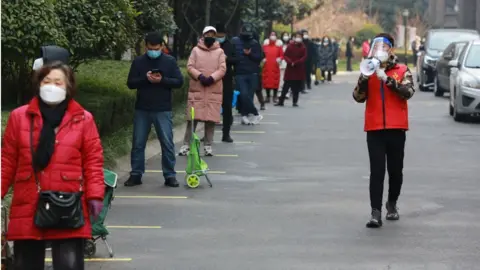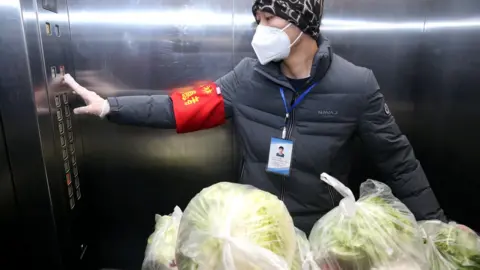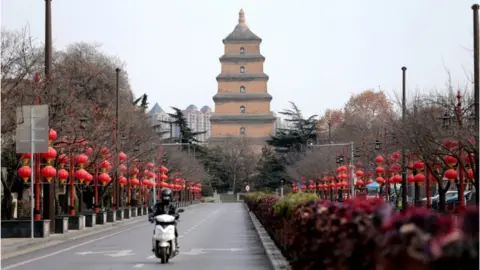Xi'an: The messy cost of China's Covid lockdown playbook
 Getty Images
Getty ImagesWith residents pleading for help while locked in their homes, and accounts of people being turned away from hospitals, the stories emerging from the Chinese city of Xi'an in recent days may sound all too familiar.
All 13 million residents have been on lockdown the past two weeks and harsh measures have been put in place to battle an outbreak, with more 1,800 cases detected so far.
Local authorities are determined to snuff it out so that it will not mar the prestige of the Winter Olympics next month, and to avoid turning the upcoming Spring Festival - where millions will be moving across the country - into a super spreader event.
But it has also shown how China's standard playbook of enforcing a hard lockdown combined with mass testing can exact a messy, harsh human cost.
Since stricter rules came into force preventing people from leaving their homes to buy food, anxious residents have said on social media that their supplies have run low, with some resorting to bartering mobile phones for food.
Government workers have been distributing aid, but the distribution has been patchy, with reports of a lack of drivers and workers to deliver supplies because of the strict quarantine.
 Getty Images
Getty ImagesSome residents were forced out of their homes in a midnight eviction and bussed to quarantine facilities, while disturbing claims have surfaced of people unable to get crucial medical attention.
A man who suffered a heart attack allegedly died and a woman who was eight months pregnant reportedly lost her baby, after they were initially refused treatment at Gaoxin Hospital due to strict Covid rules.
Authorities have since barred local hospitals from rejecting patients, and suspended the hospital's director.
Many reading these stories online have been left horrified and in disbelief. For some it is a bad case of déjà vu, with shades of the ordeal endured by residents in Wuhan at the start of the pandemic.
The complicated reality
Two years on, after numerous strict lockdowns across China, some are asking how such mismanagement and lack of planning can still be happening - and if authorities have learnt anything at all.
"There has never been any serious discussion on what lessons we have learnt from Wuhan, there has been no debate. The narrative has just been about the success of the Chinese model versus the ineffectiveness seen in Western democracies," Professor Yanzhong Huang, a senior fellow in global health with the Council of Foreign Relations, told the BBC.
The only thing officials have learnt would be dealing with an outbreak with a blunt zero Covid strategy, he added.
China's top-down policymaking has meant that when local officials are assigned broad targets, "they often have no alternatives but to rely on heavy-handed, one size fits all approaches in getting things done", as seen in the extreme measures seen in Xi'an.
This has resulted in "overreaction or overshooting… in dealing with even a small number of cases".
The situation in Xi'an has also shown that, despite the image of monolithic power and efficiency that the Chinese Communist Party likes to project, the reality on the ground can sometimes be a lot more disorganised.
Chinese government on a local level is decentralised, and many local officials have been "set very ambitious goals of having zero Covid, but get very little central government resources" and not much power to deal with an outbreak when it arises, points out Professor Donald Low, an expert in Chinese governance with the Hong Kong University of Science and Technology.
 Reuters
ReutersThis has meant that "on the one hand, local officials cannot singlehandedly lock down a district, but on the other, they are required to organise food delivery to more than a million residents at short notice," wrote China studies professor Christian Goebel of the University of Vienna in an online analysis.
"If it works out, the centre takes the credit, if it doesn't, local officials are blamed and given the boot."
Two senior party officials in Xi'an have been sacked, while dozens more have been punished.
The way out?
But the larger problem is the diminishing returns of the zero Covid policy.
Experts warn that as Covid evolves and more transmissible variants emerge, it could lead to increasingly harsh measures to maintain the same level of suppression.
Though zero Covid still has widespread support, people's patience will only be stretched thinner.
In Xi'an for instance, there has been already some backlash against state media's attempts at propaganda, such as social media hashtags, to rally spirits.
"#TouchingMomentsofXi'anFightingCovid my ass," read one comment on social media site Weibo, before it was swiftly scrubbed by censors.
China has so far shown no signs of easing up on zero Covid and appears to be content waiting for the global pandemic to end - but with new variants like Omicron popping up, many believe this will not happen anytime soon.
So could China find a swift exit out of what may be an eventually unsustainable policy?
Prof Huang believes there is a window between two highly politically sensitive events - the Olympics next month and 20th Communist Party Congress at the end of the year - where China could take steps towards living with Covid.
One way it could do this is by finding more effective vaccines and Covid therapies, and educating the Chinese public to fear the virus less.
Another would be selecting some cities to trial out a more eased approach - but even this would be politically difficult, warns Prof Low.
"Which cities would they choose? And having told citizens that the virus is the enemy, this would seem like a betrayal," he said, adding that many are still worried about China's weaker healthcare system outside of major cities and the effectiveness of local vaccines.
In the meantime, Chinese citizens will continue bearing the brunt of the measures.
In an impassioned essay published on messaging platform Wechat - which was later scrubbed - Xi'an journalist Jiang Xue detailed the difficulties residents have been facing under lockdown and pleaded for change.
"After this is all over, if we do not reflect, do not absorb the lessons eked from blood and tears, and rush to hand out awards and sing praises of achievements - then the people's suffering has been borne in vain."
